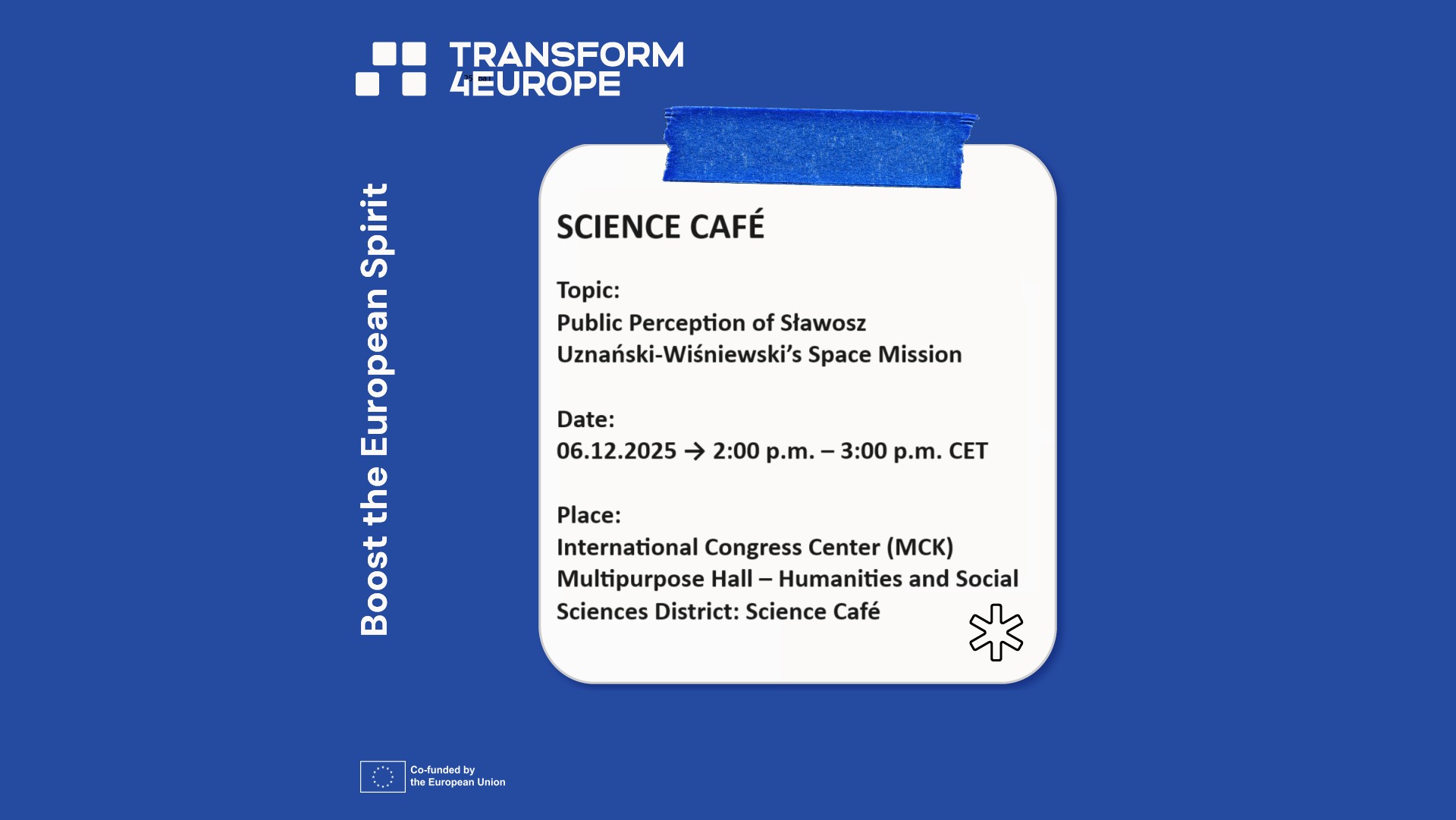T4EU Science Cafe – Social Perception of the Space Mission of Sławosz Uznański-Wiśniewski

On Saturday 6 December, at 3–4 pm (EET), the Transform4Europe Alliance invites students and university staff to participate in another Science Café event. As part of Silesian Science Festival, a discussion will be held on Social Perception of the Space Mission of Sławosz Uznański-Wiśniewski. The event will be hosted online and at the International Congress Centre in Katowice, Poland.
The meeting will begin with a presentation of research findings on the social perception of spaceflight. The main issues will include:
- Recognition of symbols and emblems of space institutions and the space industry
Analysis of public awareness regarding graphic signs, logos, and symbols used by space agencies, industry companies, and mission programs. The results will show how present these elements are in public consciousness and what meaning we assign to them.
- Emotions accompanying different stages of Sławosz Uznański-Wiśniewski’s mission
A study of emotional reactions during key moments of the flight—from preparations, through launch, time in orbit, to return. The analysis will help understand which phases evoke the greatest interest, pride, anxiety, or excitement.
- Opinions about astronauts’ work and expectations for future missions
Focus on psychological variables: how we perceive the role of astronauts, what expectations we have of them, and how we imagine the future of spaceflight and Poland’s participation in space exploration.
- Attitudes toward science – values, trust, tradition
Analysis of knowledge and attitudes toward science and technology: do we trust scientists, and what values do we attribute to science?
After the presentation of research findings, there will be a moderated discussion with invited guests aimed at reviewing the conclusions and formulating practical recommendations for the future.
Speakers
Łukasz Jach, Professor at the University of Silesia in Katowice – psychologist and sociologist from the University of Silesia in Katowice. Author of books and articles on attitudes toward science and its role in today’s world. Member of an interdisciplinary team studying opinions among Poles about space flights and space research, as well as the psychological contexts related to these opinions. Additionally, a fan of fantasy and science-fiction literature. Among books about space, the trilogy by Cixin Liu made the greatest impression on him.
Pedro Rodrigues Ribeiro recently delivered his doctoral thesis in Applied Psychology, conducted jointly at Universidade Católica Portuguesa, Blanquerna – Universitat Ramon Llull, and Nottingham Trent University, with a focus on advanced consumer research methodologies. He holds a BEng in Biomedical Engineering from Middlesex University London and an MSc in Biomedical Engineering from Universidade Católica Portuguesa.
Pedro is currently a Research Scholar at the Human Neurobehavioral Laboratory (HNL) at Universidade Católica Portuguesa, where he first joined in 2021 as a Master’s student and later as a Doctoral candidate. His research spans human behavior and decision-making, EEG and fNIRS methodologies, Brain–Computer Interfaces, and Cognitive and Affective Neuroscience.
In addition to his academic work, Pedro serves as Treasurer and Engagement Officer of IEEE Young Professionals Portugal, contributing to national initiatives in engineering, education, and community engagement.
Jan Świerkowski is a Polish artist, curator, cultural researcher and astronomer. He is the founder and curator of the international art and science collective Instytut B61.
In 2010, Jan Świerkowski graduated with a degree in astronomy from Nicolaus Copernicus University in Toruń (Poland), where he now serves as an honorary ambassador. Prior to his graduation, he founded Instytut B61 a collective of artists and scientists. Established in 2009 as part of the UNESCO International Astronomy Year, the group explores the invisible realms of particle physics and astronomy, creating large-scale immersive experiences, exhibitions and performances. Świerkowski curates the group’s activities, utilizing his experimental cognitive methodology that fosters collaboration between artists and scientists, which eventually led him to obtain a U.S. patent in 2022 for a System for a Multimodal Educational Display in a Pop-up Science Center. Since 2016 he has been a member of the Research Center for Communication and Culture in Lisbon and a scholarship holder of the Portuguese Fundação para a Ciência e a Tecnologia (2016 – 2022). In 2018, Świerkowski was awarded the title of the Popularizer of Science 2017 in the Activity Leader category by the Polish Press Agency and the Polish Ministry of Science and Higher Education. In 2023, Świerkowski received a PhD in cultural studies through a joint program at Universidade Católica Portuguesa and the University of Copenhagen, furthering his interdisciplinary research at the intersection of art, science, and culture. In 2024 he became a member of the MBA in Art Innovation program held by the Global Leaders Institute.
Moderator: Jacek Nowak – Director for Industry Cooperation, University of Silesia in Katowice.












